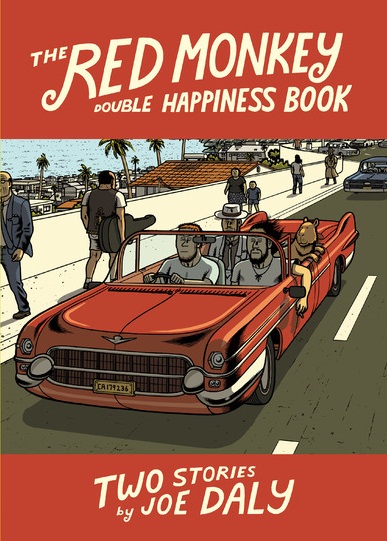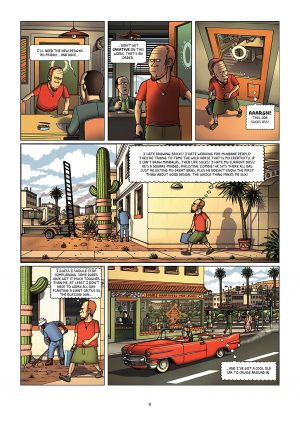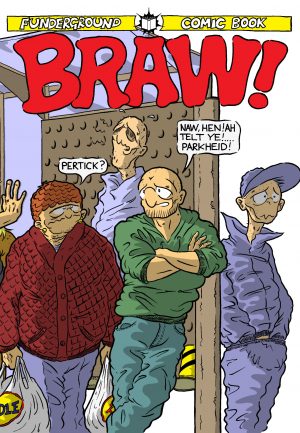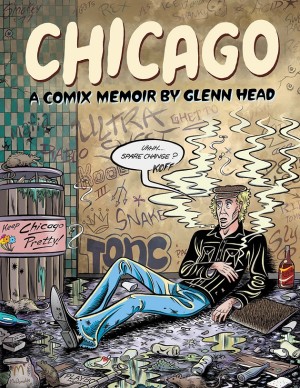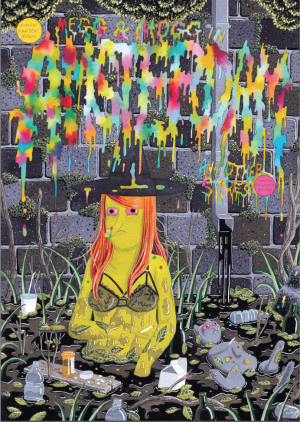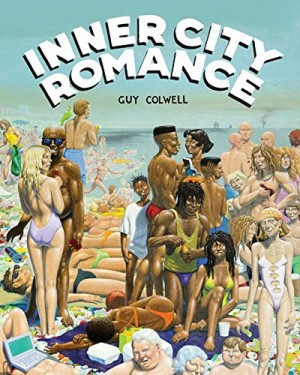Review by Jamie McNeil
Joe Daly is an outstanding artist with the honour of being the first South African cartoonist published by Fantagraphics via his debut collection of short stories, Scrublands. The Red Monkey Double Happiness Book followed with two short stories based in the South African city of Cape Town. As a writer Daly takes his inspiration from unlikely sources, in this case, the effects of global warming, eco conservation, conspiracy theories and marijuana all wrapped up in a mystery caper.
Dave’s life hasn’t worked out the way he hoped. Instead of creating comics he does freelance advertising work, his girlfriend has dumped him, his best friend Paul is a freeloading stoner, his flat has flooded, and he’s self conscious about an unsightly genetic foot disorder. His pleasures come from driving his classic car and sampling ganja provided by Paul who, he admits, is good company. Compounding his woes is a disturbing noise emanating from his homicidal neighbour’s flat. When Dave notices said neighbour carrying a cello case leaking strange fluid, his curiosity gets the better of him. It leads Dave and Paul to solve bigger mysteries, save the earth and fight off shady businessmen while learning to accept yourself for who you are.
Daly is an artist who starts well but finishes much better, improving each time he approaches the material. Case in point is the differences between first story ‘The Leaky Cello Case’ and the following ‘John Wesley Harding’ (yes, it’s also a 1967 Bob Dylan album). Initially there’s a distinct Beavis and Butthead vibe to Dave and Paul, with pronounced foreheads and sharp features. By ‘John Wesley Harding’, the duo have softer edges and are less angular. Artistically Daly captures the essence of Cape Town with its sublime mixture of suburban and colonial architecture, nestled against the foot of picturesque Table Mountain. The surrounding wetlands and city avenues brim with character, pleasure in observing a hike through marsh or a car taking nine panels to leisurely pass by. It’s a truly cinematic experience rendered in fantastic colour. Compared to the intricate detail of his later black and white work, this is fairly simple but highly complimented by the colouring. In that sense it feels less underground than his later Dungeon Quest series, but the elements of the genre are there in the writing. The paranoia about big companies raping the earth for property, the commentary on wildlife crime, the politically incorrect references and drug use are present, though toned down compared to later work. Daly walks the razor’s edge between these devices driving the story and the point where they might become incoherent ramblings. The ecological message of this is our world, lets look after it, certainly influences the story, but isn’t a critical component, the plot perambulating gently as it both champions conservation and parodies the eccentrics who participate.
The entire volume feels like a distinct love letter to the beauty of Cape Town. One character even resembles musician Rodriguez, a man with his own rich local legend as documented in the insightful film Searching for Sugarman. To Capetonians nothing exists beyond their beloved city, nowhere else is worth consideration. It highlights the romanticism with which Cape Town is viewed, not the reality of stark poverty and dangerous slums existing on its outskirts.
Daly is an artist committed to personal development and experimentation, who sees the humorous possibilities in serious subjects. If you’re a fan of abstract sitcoms like The Mighty Boosh or stoner films like The Pineapple Express and Up In Smoke, you may want to give this a spin.
